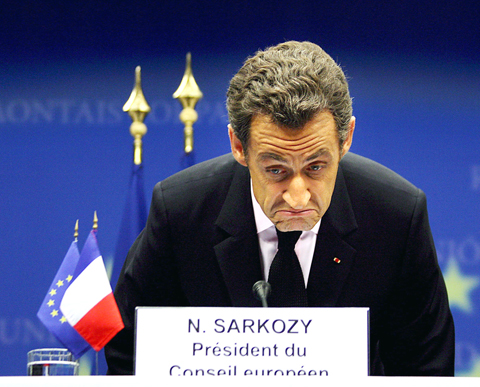French President Nicolas Sarkozy was left scrambling for a way to relaunch his once relentless reform drive yesterday after a humiliating defeat in nationwide regional elections.
French Prime Minister Francois Fillon was to meet the French leader at 9am following Sunday’s debacle, which left Sarkozy’s right-wing Union for Popular Movement (UMP) in charge of only one of France’s mainland regions.
There have been reports that Fillon will offer to resign, but at the very least observers expect a Cabinet reshuffle that will signal a new start in Sarkozy’s campaign to persuade France to swallow difficult reforms.

PHOTO: EPA
“Tonight’s result confirms the success of the left’s lists. We have not been convincing,” Fillon admitted on Sunday after the Socialist-led opposition beat the UMP by about 54 percent to 36. “This is a disappointment for the governing party. I take my share of responsibility, and tomorrow morning I’ll take this up with the president.”
If confirmed, the estimates — based on samples of cast ballots by polling agencies — leave Sarkozy’s supporters in control of only one of France’s 22 mainland regions, their right-wing stronghold of Alsace.
The left, dominated by the Socialist Party, appeared to have held onto the mainland and the Caribbean island of Guadeloupe and to have won a tight race to wrest Corsica from the UMP.
The UMP consoled itself with having taken back French Guyana and the Indian Ocean island of Reunion in the vote to elect the regional councils that are in charge of transport, education and cultural policy.
“The French have expressed their rejection of the politics of the president and the government,” Socialist party leader Martine Aubry said, calling on the left to unite behind a program to retake power at a national level.
Turnout, although low, was around 4 percent higher than in last week’s first round. Polling agencies TNS-Sofres and OpinionWay separately predicted that the second round abstention rate would be 49 percent.
Last week’s first-round vote saw the French leader’s right-wing supporters win their lowest share of the vote in more than three decades. The party’s final score was higher, but still low enough to constitute a stark defeat.
Sarkozy, who still has a comfortable majority in the national parliament, has insisted that the regional poll is not a verdict on central government, but he is expected to order a reshuffle in the next few days.
For many French newspapers, however, it was the president rather than his government or his prime minister who was to blame for the right’s poor electoral showing.
Yesterday’s edition of the Lyon-based paper Le Progres mocked Sarkozy as the “hyper president” who had become the “hyper loser;” Le Telegramme, another regional daily, attacked what it described as Sarkozy’s autocratic style.
The results “send the same message all across France and obliges the head of state to read it as a national punishment and thus to come up with answers to the concerns of the electorate,” the regional daily La Montagne said.
Certainly, the result was another blow to a president whose personal approval ratings are at an all-time low and will likely increase pressure within his own party for a change of direction.
One opinion poll yesterday suggested that most French people wanted the president to change his approach to leading the country.
The poll, by CSA for Le Parisien newspaper, had 54 percent of those polled agreeing that Sarkozy should adopt a “more presidential style.”
Only 30 percent of the 2,004 respondents questioned on Sunday thought he should maintain his present style.

Nauru has started selling passports to fund climate action, but is so far struggling to attract new citizens to the low-lying, largely barren island in the Pacific Ocean. Nauru, one of the world’s smallest nations, has a novel plan to fund its fight against climate change by selling so-called “Golden Passports.” Selling for US$105,000 each, Nauru plans to drum up more than US$5 million in the first year of the “climate resilience citizenship” program. Almost six months after the scheme opened in February, Nauru has so far approved just six applications — covering two families and four individuals. Despite the slow start —

North Korean troops have started removing propaganda loudspeakers used to blare unsettling noises along the border, South Korea’s military said on Saturday, days after Seoul’s new administration dismantled ones on its side of the frontier. The two countries had already halted propaganda broadcasts along the demilitarized zone, Seoul’s military said in June after the election of South Korean President Lee Jae-myung, who is seeking to ease tensions with Pyongyang. The South Korean Ministry of National Defense on Monday last week said it had begun removing loudspeakers from its side of the border as “a practical measure aimed at helping ease

DEADLY TASTE TEST: Erin Patterson tried to kill her estranged husband three times, police said in one of the major claims not heard during her initial trial Australia’s recently convicted mushroom murderer also tried to poison her husband with bolognese pasta and chicken korma curry, according to testimony aired yesterday after a suppression order lapsed. Home cook Erin Patterson was found guilty last month of murdering her husband’s parents and elderly aunt in 2023, lacing their beef Wellington lunch with lethal death cap mushrooms. A series of potentially damning allegations about Patterson’s behavior in the lead-up to the meal were withheld from the jury to give the mother-of-two a fair trial. Supreme Court Justice Christopher Beale yesterday rejected an application to keep these allegations secret. Patterson tried to kill her

CORRUPTION PROBE: ‘I apologize for causing concern to the people, even though I am someone insignificant,’ Kim Keon-hee said ahead of questioning by prosecutors The wife of South Korea’s ousted former president Yoon Suk-yeol yesterday was questioned by a special prosecutor as investigators expanded a probe into suspicions of stock manipulation, bribery and interference in political party nominations. The investigation into Kim Keon-hee is one of three separate special prosecutor probes launched by the government targeting the presidency of Yoon, who was removed from office in April and rearrested last month over his brief imposition of martial law on Dec. 3 last year. The incident came during a seemingly routine standoff with the opposition, who he described as “anti-state” forces abusing their legislative majority to obstruct